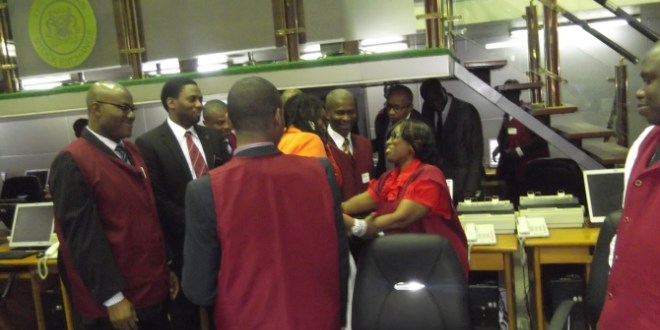The Nigerian Stock Exchange’s market capitalisation recorded a growth of N282bn at the close of trading on Thursday, one day into the country’s economic recession.
A total of 25 stocks appreciated in price, while 13 recorded price declines.
The NSE market capitalisation soared to N9.760tn from N9.478tn, while the NSE All-Share Index also closed at 28,419.92 basis points from 27,599.03 basis points.
The market traded on 229.225 million shares worth N2.117bn in 3,243 deals.
The highest index point attained in the course of trading was 28,419.92 basis points, while the lowest and average index points were 27,368.41 and 27,666.28 basis points respectively.
Dangote Cement Plc, CAP Plc, FCMB Group Plc, AIICO Insurance Plc and Wema Bank Plc emerged as the top five gainers.
The shares of Dangote Cement appreciated by N15.11 (8.59 per cent) to close at N191 from N175.89, while those of CAP closed at N31.57 from N30.09, gaining N1.48 (4.92 per cent).
FCMB share price also appreciated by N0.05 (4.90 per cent) to close at N1.07 from N1.02, while AIICO shares soared to N0.66 from N0.63, gaining N0.03 (4.76 per cent).
Wema bank shares also gained N0.03 (4.55 per cent) to close at N0.69 from N0.66.
Other gainers were Sterling Bank Plc, Fidson Plc, Trans-nationwide Express Plc, NPF Microfinance Bank Plc, Law Union and Rocks Insurance Plc, Fidelity bank Plc, amonmg others.
On the other hand, Caverton Offshore Support Group Plc, Tripple G Plc, Chellaram Plc, May and Baker Nigeria Plc, Cutix Plc, among others emerged as the top five losers.
The NSE had on Wednesday, appreciated by N36bn despite confirmation by the Nigerian Bureau of Statistics that the economy was in recession.
The equity market maintained positive momentum, appreciating by 0.39 per cent.
The NSE market capitalisation rose to N9.478tn from NN9.442tn, while the All-Share Index closed at 27,599.03 basis points from 27,493.12 basis points.
A total of 262.614 million shares valued at N4.881bn exchanged hands in 3,302 deals.
The second quarter 2016 Gross Domestic Product data showed a contraction of 2.06 per cent year-on-year (Q1 2016: -0.36 per cent). July headline inflation spiked to 17.1 per cent year-on-year from 16.5 per cent and unemployment rate jumped to 13.3 per cent from 12.1 per cent.
On the global scene, markets traded mixed as investors reacted to a slew of data from the Eurozone and looked forward to the key August United States non-farm payroll data due Friday.
Having lost in the previous session, the oil and gas and financial services sectors rebounded to lead advances, following gains on Seplat Petroleum Development Company Limited(+10.25 per cent), Oando Plc (0.61 per cent), Guaranty Trust Bank Plc (1.53 per cent), Ecobank Transnational Incorporated Plc (0.35 per cent) and FBN Holdings Plc (1.67 per cent).
The consumer goods and industrial goods sectors continued on an upward trend, albeit marginal, as 7UP Bottling Company Plc (9.38 per cent gains), Honeywell flour Mill Plc (five per cent loss), Dangote Cement Plc (0.22 per cent gain) and Julius Berger Nigeria Plc (9.71 per cent loss) traded mixed.
Market breadth turned negative with 19 advances and 21 declines.
Commenting on the performance, analysts at Vetiva Capital Management limited, in the firm’s daily market analysis, said, “We believe the economic data releases are not far away from market expectation, hence, the muted impact on market.
“Nonetheless, we believe investors would digest the numbers more cautiously, and think this could result in mixed trading pattern in the session ahead.”


 Naira4 weeks ago
Naira4 weeks ago
 Naira4 weeks ago
Naira4 weeks ago
 Travel4 weeks ago
Travel4 weeks ago
 Jobs4 weeks ago
Jobs4 weeks ago
 Naira4 weeks ago
Naira4 weeks ago
 Naira3 weeks ago
Naira3 weeks ago
 Investment4 weeks ago
Investment4 weeks ago
 Travel4 weeks ago
Travel4 weeks ago



























